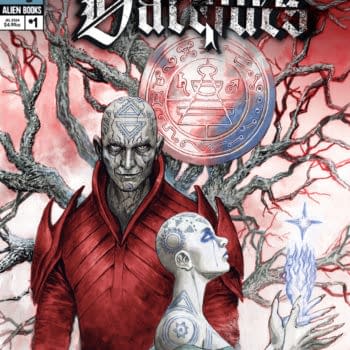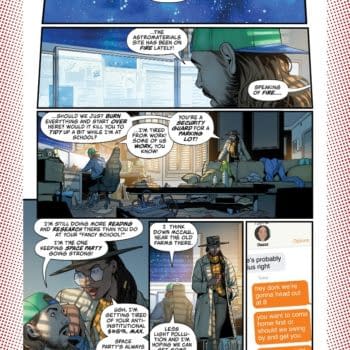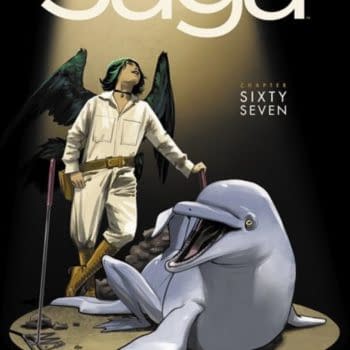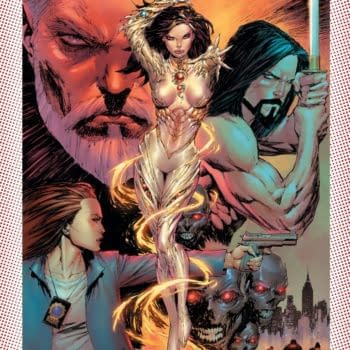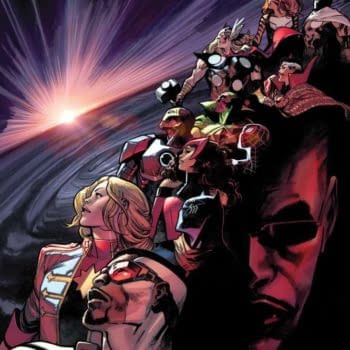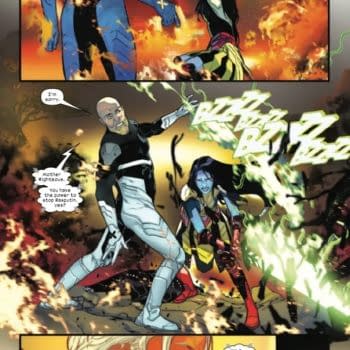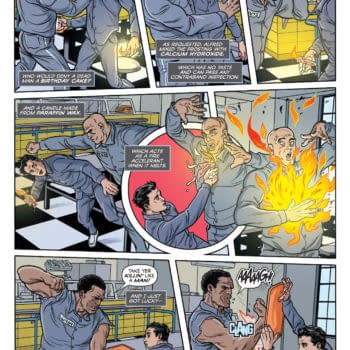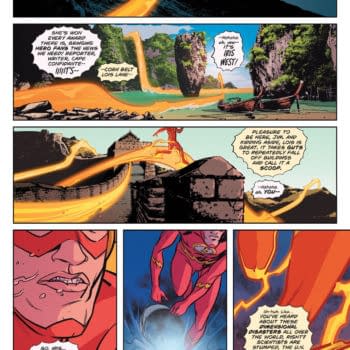Posted in: Comics | Tagged: Alan Moore, avatar press, comic, entertainment, Fecundo Percio, Glycon, God is Dead: Book of Acts "Alpha", jimmy's end, mike costa
This Is Glycon Ground Zero – When Alan Moore Makes Himself As Fictional As The God He Worships
Warning. I am writing this article while hopped up on a heady mix of tramadole, morphine and oxygen… The OMT drugs sandwich, recovering from a tonsillectomy. But before I left for the hospital, I picked up a copy of God Is Dead: Book of Acts "Alpha".
I read it high, so I might as well write about it high too. I hope Alan will approve.
But first, a digression. There may be a number of these.
The last time I wrote Alan Moore as a fictional character, it was for a comic called Watchmensch, timed to come out at the same time as the Watchmen movie. With Simon Rohrmuller on art, doing a spitting image of Dave Gibbons style, I ended up dropping a two hundred foot clone of Alan on Manhattan, squashing the New York premiere of the movie.
I'm not alone however, many people have used Alan in fiction. I can't deny that his hirsute qualities and choice of jewelry add to this, but he strikes such a dashing figure, it's a real temptation to add him to stories. Whether a man who wanders in and transforms everything, in Eddie Campbell's Alec work, as a teenage girl in one rather sensational manga, or as a Little Lulu reading ripped action figure in The Simpsons, the temptation is widespread.
I've never asked Alan how he feels to be fictionalised so much, in comics and other media, but it's something he seems to have embraced himself. Playing Mr. Metterton in the Jimmy's End films saw him representing both a version of God and a retired stand up comedian turned working men's club owner in the same character. As the writer of the films, he was simply playing himself, and in this respect he was God, able to affect all that happened with a flick of the keyboard.
And in this week's God Is Dead, he did something similar:
God Is Dead is the Jonathan Hickman created series for Avatar Press, now taken up by Mike Costa, in which the gods have returned to Earth – all of them – and are kicking the place about quite a bit.
And for two special issues, Avatar Press have got some of their other writers to join in, such as Si Spurrier and Kieron Gillen, as well as Mike Costa, telling smaller shorter stories within the larger world. In Book Of Acts: Alpha, Mike Costa gives us a mini whodunit, while Si Spurrier has a bar confessional from a cherub rather disappointed in the way the Renaissance reinterpreted him and his ilk and the effect it is still having on a YouTube generation. It's ace.
Alan Moore's, however, is a little more personal. It is well known that he worships the god Glycon, a Roman god exposed as a puppet of a deity in the first century. Alan not only worships a fictional god, but one that is explicitly so. Those who worship gods believe them to be real, Alan explicitly knows his to be false. Or is it?
So Glycon has to come back, along with all the others. In God Is Dead: Book Of Acts "Alpha", we go to Northampton, and Alan's terraced home. And, yes, the reference supplied to artist Facundo Perci0 is spot on. But then Alan just had to go outside his door with a camera.
Just as in Jimmy's End, Alan takes the stage with some remarkably natty shoes. But no gold paint this time–the attention is on Glycon.
Because Glycon's return is not as easy or as literal as the others. As an explicitly fake god, he has to be made, constructed, picked together, an Emu for Alan's Rod Hull (look him up on YouTube with Michael Parkinson).
So rather than Alan being the god in the spotlight, the attention is on Glycon, definitely a hand puppet but also quite clearly a god. You cannot see Alan's lips move. He drinks water but never says "gottle of geer". With a message for all the public and gods assembled there for the show. But is Glycon the god? Is Alan the god? He certainly has enough worshipers, but is that enough? This is clearly all fiction, but is it also true?
As Alan once observed, the only place that gods are undeniably true is in the human mind, the realisation that led to him declaring himself a magician. Alan talks about his magic and his worship as being the font of his ideas and his work.
While the audience of the fictional Alan and his fictional god are the other gods and their followers, the real audience is us. Alan is explaining his world view, justifying explicitly his use of gods and magic in his work and providing cliff notes for anyone curious about similar statements he has made in the past. It's all here, literally spelled out, even as he is heckled by, well, at one point, Jesus. I suppose if you are going to make enemies, might as well make important ones.
Because for Alan, the fiction, the idea is the point. And he explains how we are all subject to fictions in our lives, especially when we believe them to be fact. Which is why he prefers a fiction that knows it is a fiction and as a result becomes the truest thing of all.
That's what the best fiction does of course. Giving us intimate fictional details that we can then transfer to our own lives, transforming them into something even more true. And, to quote Paul Daniels (no need to YouTube search for him), that's magic.
Look I'm high right now. And Alan's speech – or rather Glycon's speech – is appealing to me on all sorts of levels. And for anyone who, like me, has been intrigued and enlivened by his tales of gods, of magic, of Glycon over the years, this comic is where it culminates. That ties in to all you know, with a rationale you may not, and makes an amazing kind of sense. I feel like saying "Dude!" a lot. But I expect I'll still feel the same way when I come down tomorrow. Because from my world of spinning skies, bright red suns on the horizon burning into my skull, and fizzing nurses, Glycon delivers some undeniable truths that burrow their way straight through all of that.
Alan Moore makes himself as fictional as the god he worships in this comic. And in doing so, gives us the utter truth about himself. It's amazing.
And man, that's a sexy glove puppet.
God Is Dead: Book Of Acts "Alpha" is available now, from Bleeding Cool's publisher Avatar Press.









